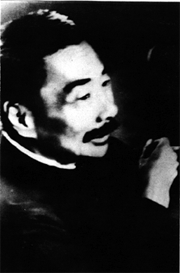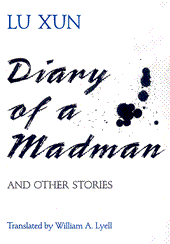
May Issue
June Issue
July Issue
Lu
Xun: The Diary of a Madman and other Stories
Translated by William A. Lyell
Rating:
![]()
This rare and comprehensive collection of short stories holds 25 excellent stories by the great Lu Xun. Recognized as one of China's greatest short story writers, Lu Xun lived during a particularly interesting and disturbing time in China's history. It helps that the translator William A. Lyell admired the intelligent and often beleaguered author. The Introduction by Mr. Lyell is so detailed and well-done, it's easy to trace the movement and changes in Lu Xun's thought. Moreover, Lyell arranges the stories in chronological order and takes advantage of the historical data available regarding the prolific writer.
My first experience with Lu Xun is via the web site www.chineseliterature.com where a few of his translated works were published. After reading Lyell's lengthy biography, it struck me that Lu Xun faced the same challenges the Filipino hero Jose Rizal faced. However, instead of facing off against the Spaniards as the Philippines' national hero did, Lu Xun had wrestled with the Chinese government and the established traditions of the Chinese people. Lu Xun was a man ahead of his time and he felt that it was through writing that he could educate people. Like most revolutionary writers (and great writers in general), Lu Xun was constantly disappointed by the results of his works. Moreover, like the best thinkers, his ideas constantly changed and his experiences strongly influenced his writing. The Diary of a Madman and Other Stories gives an accurate description of both China and Lu Xun.
I admit I often hurried through this 380 page compilation and this was because it was so difficult to read. Lu Xun was such a great author that his simple stories would strike at your very core. Although the protagonists (often Lu Xun himself) went about in such an accepting and humble manner, it was sad to read about their struggles and suffering.
"Diary of a Madman" is a unique story and I've never read anything comparable to it - its title is surprising and disarming. It alone is enough to entice the reader, but it is not Lu Xun's best. "Kong Yiji," however, is much more memorable as I could truly relate to the pedantic protagnist who suffers for his own sins. Both "Medicine" and "Tomorrow" both deal with the deaths of children and its heartbreaking prose can move even the most jaded reader. Indeed, most of the stories in the compilation focus on poverty and survival while maintaining the many traditions and unique behavior the Chinese adhere to.
Lu Xun talks about the fears and ways of his time in "The Story of Hair," "A Passing Storm" and "Hometown." He chastises himself (and ourselves) in "An Unimportant Affair" when he fails to recognize an opportunity for compassion. His masterpiece is arguably "Ah Q-the Real Story" though many readers unfamiliar with modern Chinese history would more likely miss the subtleties of Ah Q's activities. All of his stories have a tragic quality to them but none more so than "The White Light" and "New Year's Sacrifice."
His writing is so powerful that just reading about the lives of ordinary people, discussed in a passing manner, is sublime ("Upstairs in a Wineshop"). As with Indian and Korean literature, most of the stories deal with family, with the plot extending to society. Besides "Kong Yiji," two other stories that affected me a great deal were "The Loner" and "Mourning the Dead." "The Loner" talks about an unsuccessful and unwed teacher who, deprived of any means of making ends meet, takes a job contrary to his nature. He dies respected and well-known but far different from the man he really was. "Mourning the Dead" is a heart-wrenching and very painful story about a man who enjoys th company of a woman. Their relationship begins to wind down as time passes, as all relationships do, until finally the protagonist makes a fateful but selfish decision.
The Diary of a Madman and other Stories does contain a few lighthearted treats such as "Some Rabbits and a Cat," "A comedy of Ducks," "A Village Opera," "A Happy Family" and "The Eternal Lamp" but they are not as well-written as some of Lu Xun's more somber creations. Moreover, they are generally eclipsed by the atmosphere of sadness in the other works by Lu Xun though even simple stories like "Brothers" and "Divorce" carries with it weight and pathos despite its amusing theme.
Although William Lyell translates Lu Xun's works for a primarily American audience (and it shows), this compilation is recommended for its copious and accurate footnotes which fully supplement each story.

Short-story writer, essayist, critic, and literary theorist who is considered one of the greatest figures in the 20th-century Chinese literature. In the West Lu Xun (Zhou Shuren) is chiefly known for his stories, which have been translated into more than a dozen languages. Lu Xun's acclaimed short stories appeared in three collections between the years 1923 and 1935. He also produced sixteen volumes of essays, reminiscences, prose poetry, historical tales, some sixty classical-style poems, and a dozen volumes of scholarly research, and numerous translations.
His contribution to China's history grossly unappreciated, Lu Xun has contrasted the hypocrisy of upper-class intellectuals with the suffering of the lower-class people in his writings. He has displayed a strong love for his country, accepting both its shortcomings and its peculiarities. He never wrote a novel.

Lu
Xun: The Diary of a Madman and other Stories
Lu Xun
Translated by William A. Lyell
 |
 |
 |
 |
 |